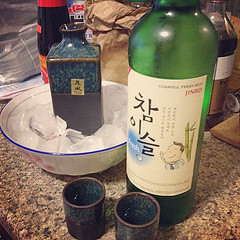5 Things Korea Does Differently

After living in Korea for 10 months, I’ve gotten pretty used to all the little idiosyncrasies. There are a few though that still stand out when I think of how much they differ from my own bringing up back home. This list is a small compilation of the differences that stand out to me the most, but I’m sure the list would look different written by another expat. We all observe the world as it relates to our own personal little worlds. Here is my list of 5 Things Korea Does Differently. Enjoy!
Meals
From the setting and (obvious) utensil difference all the way to meal portions, South Korea does meals different than anything I’ve ever experienced. Typical Korean food is meant to be shared. This means a bunch of tiny side dishes, a protein, and often a soup. A soup for the table doesn’t come with small bowls; usually diners just take a spoonful as they please. I hope you’re not a germophobe because in Korea sharing food is important. It shows that you care about the other person and that you are kind. People who don’t offer to share their food are considered very rude or selfish in Korea. Read more about sharing food in your office here.
Respect
A major aspect of Korean culture and daily life is respecting one’s elders. It was hard for me to adjust to this level of respect at first – not because I’m rude or don’t feel my elders deserve my respect, but because the level of respect shown here is higher than anything I’ve ever experienced. One afternoon at school, my co-teachers and I were enjoying lunch in the office. We were already halfway through our meal when our principal walked in to talk to a co-worker about her schedule. The entire room jumped to its feet, and in my panic I jumped to stand alongside everyone and nearly knocked over my rice bowl.
Everyone stood standing awkwardly for the entire three minute conversation that our principal had with the co-teacher. This is a level of respect I had never experienced. In America, I simple smile and greeting to the principal would have sufficed. At times, for me personally it almost feels like just too much, but I’ve learned to deal with it since it is such a big part of Korean culture.
Friendships
In America, the ages of my friends fall at extreme places on a spectrum. I have friends that are younger than me, my age, and older than me. In fact, I hardly realize, much less acknowledge, anyone’s age anymore. If you’re a good person and we have similar personalities or interests, I’ll be your friend. Age really doesn’t matter. In Korea, this way of thinking isn’t normal. Koreans stay friends with people their own age and that’s the way it is. Of course, they hang out with people older and younger than themselves, but the relationship will never be as close.
There will always be a level of formality lingering in meetings that isn’t present when they hang out with friends their own age. Relationships and friendships is also another area in Korea where respect plays a big part. If you’re hanging out with someone older than you, you are expected to use honorifics when speaking to them and follow the unspoken social rules of eating and drinking with them.
Staff Dinners
I actually love this difference because even though there is a level of formality to staff dinners, they actually can be very fun. Koreans drink when they eat to celebrate. That’s just a fact of life in Korea. The dinners that occur quite often at my school always follow a routine. The teachers usually sit together by age, a few courses are served to us, and the alcohol always flows. It’s hilarious to watch the senior teachers cut loose and get tipsy.
Coffee
If you’re the type of person who has “don’t talk to me until I’ve had my coffee” stamped on their forehead every morning, then you might be a little discouraged when you discover how different Korea’s coffee culture is. America’s favorite morning pick me up has created a demand that coffee houses have realized and supplied us with our need. Because we crave coffee in America, cafes are now open 24/7 and even independent coffee shops will open at 5am to accommodate our caffeine addiction.
Korea, however, doesn’t “need” coffee like we do. Coffee is seen more as a luxury and a trend than a drug. Korean teens – especially couples – will hang out in coffee shops for hours just chatting, but the strange thing is that most coffee shops get the majority of their business at night! Because of that fact, most coffee shops don’t open until 10 or 11 am, well after most of us have already headed off to work grumpy because we haven’t had our fix yet. Luckily, a few big chains are usually open and if there’s one in your area, you’re in luck! Dunkin’ Donuts, McDonald’s, and Starbucks are places you can find open early most mornings. When worse comes to worst and these chains aren’t by you, you can always settle for a canned coffee. Take my advice, though, and stay away from mixed coffee. It’s all sugar and no caffeine. Blegh.
If you’ve been abroad before, what difference did you notice in that country? What differences were too big to ever get over? Tell us in a comment below!





One Response
Great article once again!